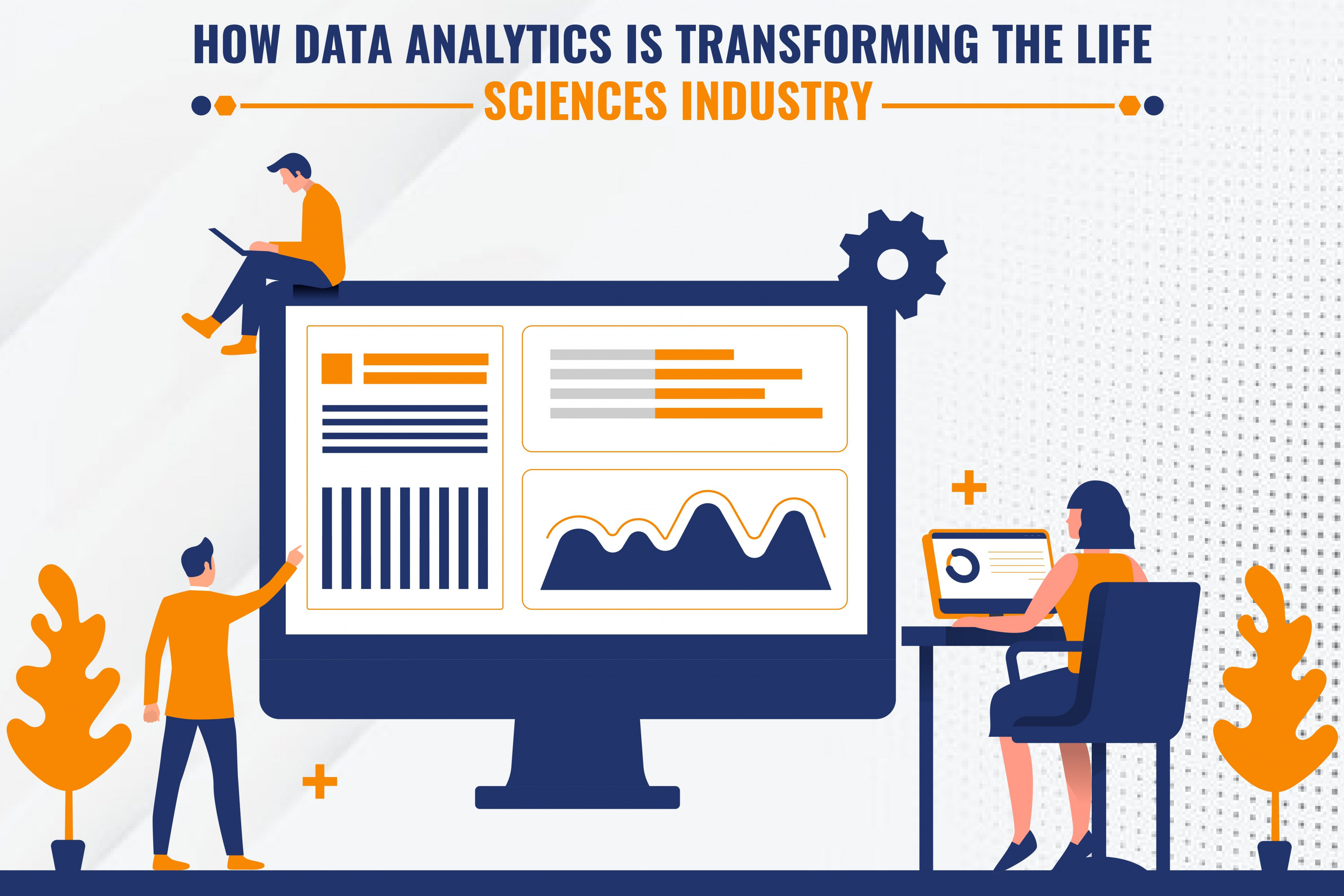
How Data Analytics Is Transforming The Life Sciences Industry
With the emerging technologies in the world of today, the life sciences industry as well is undergoing a major transformation & thanks to the power of data analytics. The advancements in technology and the availability of vast amounts of data have revolutionized the way life sciences companies operate and make critical decisions. In this article, we will explore the significant impact of data analytics on the life sciences industry and how it is shaping the future of healthcare and scientific research.
The Power of Data Analytics & Its Impact On the Life Sciences Industry
Data analytics is the process of examining large and complex sets of data to uncover meaningful patterns, correlations, and insights. In the life sciences industry, this practice has become an indispensable tool for researchers, healthcare providers, and pharmaceutical companies. By harnessing the power of data analytics, organizations can gain valuable insights that were previously unimaginable, enabling them to make informed decisions and drive innovation.
Enhancing Research and Development
One of the most significant benefits of data analytics in the life sciences industry is its ability to accelerate research and development (R&D) efforts. With the vast amount of data available, scientists can now analyze complex biological systems, identify patterns, and understand the underlying mechanisms of diseases. This enables them to develop more effective treatments, personalized medicine, and innovative therapies.
Data analytics also plays a crucial role in drug discovery and clinical trials. By analyzing patient data, genetic information, and medical records, researchers can identify suitable candidates for clinical trials, predict drug efficacy, and reduce the time and cost involved in bringing new drugs to market. Furthermore, data analytics allows for real-time monitoring of clinical trials, enabling researchers to make timely adjustments and ensure patient safety.
Improving Healthcare Delivery
Data analytics is revolutionizing healthcare delivery by providing actionable insights that enhance patient care and outcomes. Through the analysis of electronic health records, patient demographics, and treatment protocols, healthcare providers can identify patterns and trends, leading to more accurate diagnoses, personalized treatment plans, and better patient outcomes.
Additionally, data analytics enables the early detection of disease outbreaks, monitoring of public health trends, and effective resource allocation. This proactive approach to healthcare management can significantly impact public health by preventing the spread of diseases and improving the overall well-being of communities. This Technical Learning of data can be of many benefits.
Optimizing Supply Chain and Operations
The life sciences industry heavily relies on efficient supply chain and operations management to ensure the timely delivery of critical medical supplies, equipment, and medications. Data analytics plays a vital role in optimizing these processes by improving inventory management, demand forecasting, and logistics.
By analyzing historical sales data, market trends, and customer behavior, companies can optimize their supply chain operations, reduce costs, minimize waste, and ensure adequate stock levels. This not only improves operational efficiency but also ensures that patients have timely access to life-saving medications and treatments; Technical Learning to the rescue.
Ensuring Regulatory Compliance and Patient Safety
In the highly regulated life sciences industry, compliance with strict regulatory standards and ensuring patient safety are of paramount importance. Data analytics can help companies streamline regulatory compliance processes, detect potential risks, and ensure adherence to guidelines.
Through the analysis of large datasets, organizations can identify patterns that may indicate non-compliance, fraud, or adverse events. This allows them to take proactive measures to mitigate risks, improve quality control, and ensure patient safety. By leveraging data analytics, companies can demonstrate transparency, maintain regulatory compliance, and foster trust among stakeholders.
The Future of Data Analytics in the Life Sciences Industry
As technology continues to advance and data becomes even more abundant, the role of data analytics in the life sciences industry will only continue to grow. With the integration of artificial intelligence (AI) and machine learning (ML) algorithms, data analytics will become more sophisticated, enabling faster and more accurate insights. So considering the changing scenarios it is advisable for professionals and businesses to invest in more Technical Training Courses that include this domain in their curriculum.
Furthermore, the emergence of wearable devices, sensors, and remote monitoring technologies will generate an unprecedented amount of real-time data in the life sciences industry. These advancements enable continuous monitoring of patient health, collecting valuable data on vital signs, activity levels, and disease progression. By analyzing this data using advanced data analytics techniques, healthcare professionals can gain deeper insights into patient conditions, identify early warning signs, and intervene promptly, thus improving patient outcomes and reducing hospital readmissions.
Revolutionizing Personalized Medicine and Genomics
Data analytics also plays a crucial role in personalized medicine, which tailors treatment plans to individual patients based on their unique characteristics and genetic profiles. By analyzing extensive genetic and molecular data, data analytics algorithms can identify specific biomarkers, predict treatment responses, and customize therapies accordingly. This approach revolutionizes the treatment landscape, providing patients with more precise and effective treatment options while minimizing adverse effects.
In addition to personalized medicine, data analytics is transforming the field of genomics owing to Technical Transformation. The analysis of vast genomic datasets allows scientists to unravel the mysteries of genetic variations and their associations with diseases. By integrating genomic data with clinical information, researchers can identify genetic risk factors, develop targeted therapies, and advance our understanding of complex diseases.
Final Words
Thus, to sum up, data analytics is transforming the life sciences industry in unprecedented ways. From accelerating research and development efforts to improving healthcare delivery, optimizing operations, ensuring regulatory compliance, and advancing personalized medicine, data analytics has become a game-changer. As technology continues to evolve and generate even more data, the role of data analytics will only become more prominent, propelling the life sciences industry into a new era of scientific discovery, improved patient care, and groundbreaking innovations.
